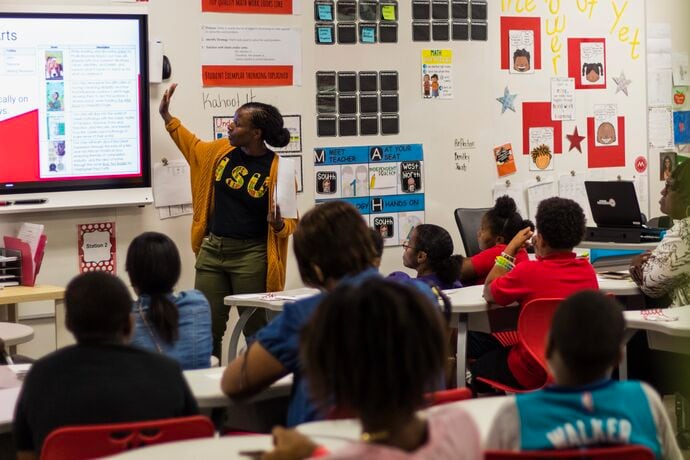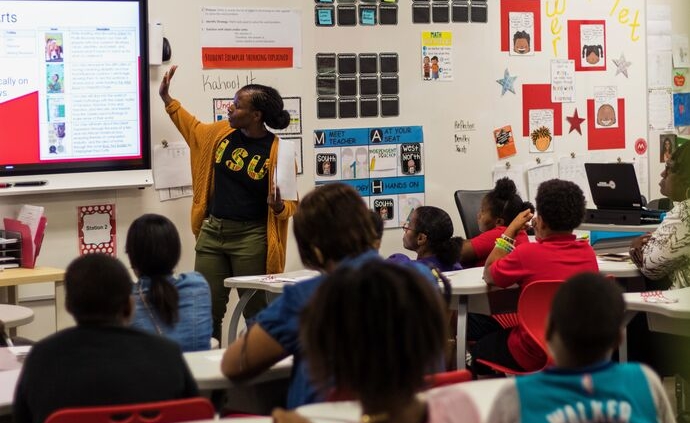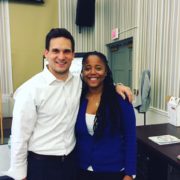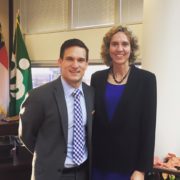#60 – The Benefits of Family Empowerment Nights + District/Charter Collaboration
Note: This piece was published and featured on Teach For America’s website on December 7, 2020 and written by Madeleine Burry. The link to the full story can be found at the end of this post. We hope you enjoy!
—
Schools host all sorts of events throughout the year: open houses, back-to-school nights, assemblies starring students, and parent-teacher conferences, to name just a few. Beginning in 2017, Ashley Park PreK-8, a district public school, and Movement Charter School—two schools that are less than a mile apart in Charlotte, North Carolina—have also held family empowerment nights.
“We wanted to create a holistic experience so we could get families connected and we could get them to also lend their voice,” recalls Meaghan Loftus (Charlotte ‘08), who was principal at Ashley Park when the empowerment nights began. (Currently, she’s partnership manager and associate at CT3, an organization that offers professional development and training for teachers.)
“When you know the family that’s behind the student that you’re seeing every day, I think there is a deeper sense of commitment that comes from that,” Meaghan says.
At the family empowerment nights, students and their families, along with teachers and staff from the two schools, gathered to mingle, eat, and engage with the evening’s themed programming. These nights also served as a touchpoint for parents to find out more about community services, such as a nearby free health clinic, job training, and housing assistance.
These evenings had a very different vibe than other school events.
“There were activities, there were books for the kids to choose from, there were tables for PTA, local after-school programs, [and] other community resources,” says Melinda Bell, a mom of four kids (three of her kids have attended Ashley Park; two are currently in school there).
The goal was for these evenings to move beyond the typical parent-teacher and student-teacher interactions, says Greg Schermbeck (Charlotte ‘08), founder and principal at SchermCo, a social impact implementation firm. His organization helped spearhead the events, leading sessions with the schools, creating an agenda, documenting events, and coordinating food and transport.
School leaders at both Ashley Park and Movement were eager to engage parents—that is, to have them show up at events, respond to communications from the school, and so on. But they also wanted to “empower families to drive change in their community and in their home,” Greg says. It was through attending family empowerment nights, for instance, that Melinda decided to join the PTA, where she now serves as vice president.
In the 2019-2020 school year, the schools hosted seven family empowerment evenings, sponsored by Wells Fargo, drawing in 1,897 attendees. (The events were cut short in February, due to the COVID-19 pandemic.)
What Happens at Family Empowerment Nights
Parents and school leaders agree: Something different—and special—occurred during the family empowerment evenings. This was a moment to build deep and meaningful connections, beyond what can occur with a one-minute chat at pick-up or drop-off.
Family nights give parents an opportunity to connect with teachers one-on-one and ask how things are going, says Lisa Link, who has a 7-year-old son who attends Ashley Park.
The nights built up a community that extended beyond a single school. “Our kids are also mingling, which is rare too, to see a charter school and a public school to link up and be partnering together. I thought that was another really cool thing, them being in our space, and us being in their space,” Melinda says.
It felt a bit like a family, she says—teachers she chatted with knew all of her kids’ names, and not just the names of her children who attended the school.
Each family empowerment night revolved around a theme (such as Black history, financial planning, or literacy), and sometimes performers, depending on the focus of the evening. There was a dinner—free and available for all attendees (parents, students, siblings, teachers, and others). Supplying dinner means that parents don’t have to worry about picking something up late at night or hurrying home early to prep a meal, Lisa points out.
As any event organizer knows, free food draws people in and drives up attendance. Transportation was available through a partnership with Lyft, making it easy for families to travel to and from the school.
Once there, parents could meet local vendors and explore community resources—33 community partners have participated during the 2019-2020 school year.
“With family night, everything was under one umbrella,” Lisa recalls—that can be helpful, since parents may not be aware of some of the resources available in the community. For instance, a Mecklenburg County Low Income Energy Assistance Program (LIEAP) helped save attendees an estimated $16,000.
Both the themes and the community partners were selected with the families in mind; data from pre-event surveys helped determine what programming would be most meaningful.
Everything combined—the themes, the vendors, the free food and transport, and the opportunity to connect—built the evening into something compelling. “We would get families to come to one and they were far more likely then to come to the next and the next and the next,” Meaghan says.

How the Program Got Its Start
The relationship between charter and public schools can be an uneasy, and sometimes competitive, one.
But Movement and Ashley Park had a bit of an edge when it came to building a collegial, cooperative relationship: Tim Hurley (Greater Delta ‘02), executive director of education at the Movement Foundation, had previously known Meaghan (the principal at Ashley Park) during his time as executive director for Teach For America Charlotte-Piedmont Triad.
And both Tim and Meaghan knew Greg of SchermCo, who’d been working separately with both schools, and eventually helped build and coordinate the family empowerment nights program.
TFA connections helped the project get off the ground, Meaghan recalls, since she felt comfortable—not adversarial—toward the charter school. As a result, she was able to smoothly collaborate with the principal at Movement to build successful, meaningful events.
Powerful Moments of Connection
For parents, the window into the school day can be opaque: queries about their kids’ days often get a one-word answer (“fine”) in response, Melinda points out. “I wonder to myself sometimes like, ‘Do you do anything at school?’” she says.
So for her—and her children—the opportunity to be at the school, to walk through the classrooms, to see what’s hanging on the bullet boards, is exciting.
That’s true for Lisa, too. Her son was eager for her to visit his classroom and point out where he sat, she says. Lisa also appreciated the opportunity to meet the kids her son mentioned (along with their parents).
Kids are joyful about introducing their parents to their teachers, Meaghan recalls. And teachers got a lot out of it too, building and deepening relationships with parents, as well as having an opportunity to chat with each other, she says.
“That kind of human connection outside of traditional bell schedules doesn’t happen often enough,” Meaghan says.
The metrics point to tangible results of the involvement.
For instance, students at Movement whose families attended two or more empowerment nights have lower levels of chronic absenteeism, Greg notes. And, there may be academic benefits as well, especially with regular attendance of the events—the percentage of Movement students scoring 70 and above in literacy and math is higher among those whose family attended two or more family nights.
Greg continues to expand the family empowerment nights—this year, he hopes to have seven schools holding similar programs. And empowering parents, as well as knitting a close relationship between parents, teachers, and students, will lead to stronger communities, he believes.
The events created a real space to seek feedback, Greg says. And attendees had a strong sense of what they—and their community—wants and needs, he points out. “ The more that we listen to people who are close to the challenge, the more they have the solution,” Greg says.
—





Leave a Reply
Want to join the discussion?Feel free to contribute!